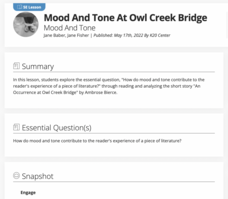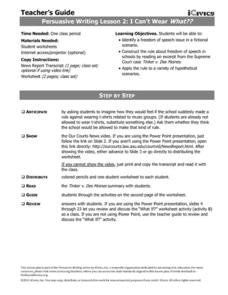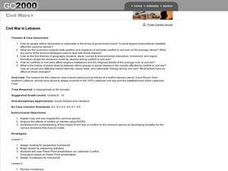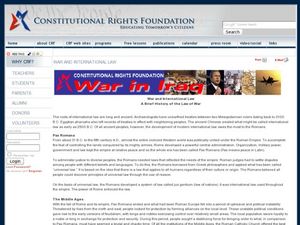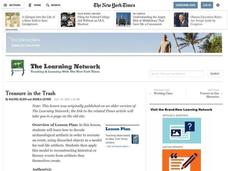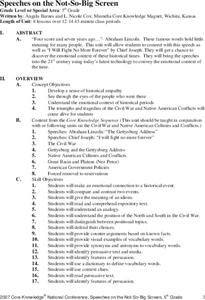K12 Reader
Abraham Lincoln Bio Poem
Everyone knows about Abraham Lincoln as a historical figure, but what was he like as a person? Young historians complete a biopoem about Lincoln, including his character traits, his relationships, his fears, and his needs.
University of Virginia
Uncle Tom's Cabin: Finishing the Novel
The reviews for Harriet Beecher Stowe's Uncle Tom's Cabin were as divisive as the novel itself. High schoolers finish the novel unit with an evaluation of the book's initial reviews, its characters' dreams and fears of...
Academy of American Poets
Teach This Poem: “As I Walk These Broad Majestic Days” by Walt Whitman
Walt Whitman's poem "As I Walk These Broad Majestic Days" offers scholars an opportunity to practice their noticing skills. They first examine a postcard of the Newport News Shipyard listing things they notice about the image and how...
K20 LEARN
Mood and Tone at Owl Creek Bridge: Mood and Tone
Two versions of movie trailers for the film Mary Poppins launch a supercalifragilisticexpialidocious lesson about how mood and tone impact a reader's experience of work. Using the provided list, readers identify the words that create the...
iCivics
I Can’t Wear What?
Can schools ban t-shirts picturing musical groups or bands? Your young citizens will find out with this resource, which includes a summary of a United States Supreme Court case from the 1960s about a similar dispute over students wearing...
Curated OER
The Brief American Pageant: The Second War for Independence and the Upsurge of Nationalism
Use this series of bright, informative maps to illustrate important events of America's infancy. Detailing the Missouri Compromise, the Battle of New Orleans, and the Presidential Election of 1812, this presentation would be a good...
Curated OER
Civil War in Lebanon
Learners explain how civil war impacts the common person. They analyze the effects of conflict on identity. They synthesize the impact of the civil war on the common person. They view a PowerPoint on Lebanese Conflict.
Curated OER
Is Gulf War Syndrome a Significant Health Issue the U.S. Government has Tried to Cover Up?
Learners examine the issues surrounding Gulf War Syndrome. In groups, they analyze evidence from the war and medical information. They participate in a debate in which they support their feelings on whether the government of the United...
Curated OER
Henry's Freedom Box
Students explore the Civil War by reading a children's book in class. In this underground railroad lesson, students read the story Henry's Freedom Box and discuss the plot, settings and characters. Students create their own "freedom box"...
Curated OER
Battle of Chickamauga Quiz
In this online interactive Civil War learning exercise, students respond to 15 multiple choice questions about the Battle of Chickamauga. Students may check their answers immediately
Curated OER
Women's Roles in Post World War II
Students discuss the role of women before, during, and after World War II. In this equality lesson, students plan how to make the workforce more equal among men and women after World War II. They research World War II and its effects on...
Curated OER
War and International Law: A Brief History of the Law of War
Students investigate the history of the law of war. In this international law lesson, students listen to a lecture regarding the history of international law spanning from Pax Romana to Collective Security. Students respond to...
Curated OER
Continue the War?
Students have to decide if they would continue the war from the Union's perspective and how would they go about doing it. Students need to read excerpts from the Congressional Globe to decide their argument. Finally, a poster will be...
Curated OER
Treasure in the Trash
Learners decode archaeological artifacts in order to recreate an event, using discarded objects as a model for real-life artifacts. They apply this model to reconstructing historical or literary events from artifacts they create.
Curated OER
Choices and Commitments: The Soldiers at Gettysburg
Students investigate the Gettysburg Campaign and the major actions for each day of the battle. They read primary source documents, write a diary entry, analyze the Gettysburg Address, and write a persuasive speech regarding an issue in...
Curated OER
Gettysburg Movie
Students create a movie that includes both sound and pictures of the Gettysburg Address using iMovie, digital cameras, and copies of the Gettysburg Address. Extensive examples of student works are given.
Curated OER
The Dred Scott Case (1857)
Students read and discuss Dred Scott v. Sandford Supreme Court case, describe in writing Constitutional principles and results of case, explain how Supreme Court decision may have helped further tensions between states, and answer...
Curated OER
Speeches on the Not-So-Big Screen
Students examine American speeches. In this interdisciplinary lesson, students explore the emotional context of historical periods as they analyze "The Gettysburg Address" and "I Will Fight No More Forever" speeches.
Curated OER
When Johnny Went Marching Off...
Eighth graders decide whether to join the Union or Confederate army. Then decide under which General you serve and in which battles you fight. Finally students create civilwar documents in assigned roles.
Curated OER
The Gettysburg Address (1863): Defining the American Union
Students explore the Gettysburg Address. In this U. S. history instructional activity, students examine Abraham Lincoln's speech and it's themes of freedom, equality, and emancipation.
Curated OER
The Emancipation Proclamation
Students explore the historical importance of the Emancipation Proclamation. In this United States History lesson, students use the internet to research the specific events that were centered around the Emancipation Proclamation, then...
Curated OER
Revive Reviews With Student-Created Study Guides
Students work cooperatively in small groups to practice note-taking and outlining skills which are applied as student create unit Study Guides for their classmates. They demonstrate critical thinking skills as they decide the most...
National First Ladies' Library
The Debate on Slavery
Young historians research the debate over slavery; some students take the pro-slavery side and others the anti-slavery side. They take the role of a character such as a plantation owner, a legislator, a free Black, a slave, or a northern...
Curated OER
Historical Scavenger Hunts
Students investigate the impact of historical events. In this historical scavenger hunt instructional activity, students examine photographs of a local monument that zoom in on details. Students record their impressions regarding the...
Other popular searches
- The Civil War Amendments
- The Civil War Battles
- Music of the Civil War Period
- The Civil War Unit Plan





